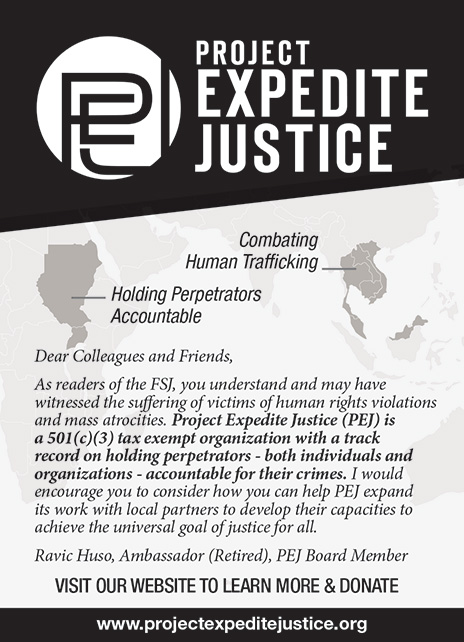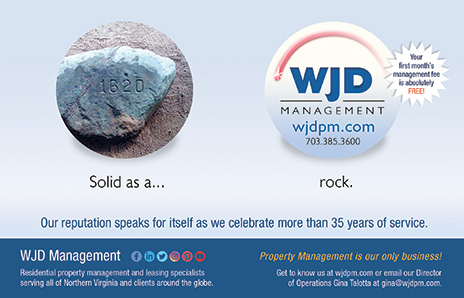Preventing Domestic Violence Is Our Shared Responsibility
Speaking Out
BY LESLIE BASSETT
Speaking Out is the Journal’s opinion forum, a place for lively discussion of issues affecting the U.S. Foreign Service and American diplomacy. The views expressed are those of the author; their publication here does not imply endorsement by the American Foreign Service Association. Responses are welcome; send to journal@afsa.org.
We like to believe that our community is immune to domestic violence, but 15 years in embassy leadership positions taught me that we are more vulnerable than we may realize.
For many of my former colleagues, the August murder of Foreign Commercial Service Officer Lola Gulomova, by her FSO husband Jason Rieff (who then committed suicide), was both a terrible shock and a powerful awakening.
The couple’s marriage had reportedly been under strain through several tours abroad until its brutal end in Washington, D.C. Many knew and respected them both. No one saw it coming, and many wondered if something could have been done to prevent this dreadful, shocking outcome.
I have had my own moments of profound shock, especially while serving overseas. The dependent spouse who psychologically abused my friend and colleague, who said nothing about it. The employee and spouse who mutually fought each other physically and loudly. The rarely seen wife who told the health unit she was afraid of her spouse, then changed her position, then was impossible for us to reach for a scary time as her husband went so far as to disconnect the phones.
Domestic violence is a challenge we need to recognize and try to preempt by early engagement on behalf of troubled families. The necessary tools include education and awareness, engagement and trust, and support and protection. This effort must include everyone in the community.
Definitions and Guidelines
What is domestic violence?
3 FAM 1811 defines it thus: “Domestic violence is any act or threat of imminent violence against a victim (other than a child) that results or threatens to result in physical or mental injury to the victim that is committed by a: (1) Spouse or former spouse of the victim; (2) Person with whom the victim shares a child in common; (3) Person who is co-habitating with or has co-habitated with the victim; (4) Person residing in the household; or (5) Any person who has a relationship with the victim and has access to the victim’s household.”
A supplementary Foreign Affairs Manual section (3 FAM 1815) addresses child abuse.
Proactive wellness strategies that carry families across post transitions could help make sure problems that festered at a previous post don’t recur at the next assignment.
For employees under chief of mission authority abroad, 3 FAM 1810 (amplified by the recent cable, 19 State 77404) requires that concerns regarding possible domestic violence be brought to the attention of what is now referred to as the Family Advocacy Team. That committee, established at every post and convened as needed, is led by the deputy chief of mission (DCM) or equivalent, and includes the regional security officer (RSO) and the regional medical officer (RMO) and psychiatrist (RMOP).
In practice, I found that the management counselor’s participation was imperative. The community liaison office coordinator (the CLO) was often involved in providing information and serving as the link to affected family members, if appropriate (this is one reason the DCM should always hold regular meetings with the CLO, by the way).
If the employee belonged to another agency, that agency head might be brought in as well. Different agencies bring different resources to the table. Law enforcement and military agencies, for instance, have guidance regarding official weapons carried by their personnel that must be considered in line with post weapons policy.
A Careful Process
Available Resources
State Department Bureau of Medical Services (MED). MED staff overseas provide medical and behavioral health support, make referrals to other professionals and authorize medical evacuations when necessary.
Victim’s Resource Advocacy Program (VRAP). The mission of VRAP is to empower those who have been victimized as a result of crimes that Diplomatic Security is investigating. Resources are specifically tailored to meet the needs of the victim and may include counseling, assistance attaining reimbursements for medical payments and lost property, accompaniment to judicial proceedings and relocation support. A representative of this office also sits on the State Department’s Family Advocacy Committee. Contact VRAP at (571) 345-9832 or vrap@state.gov.
The Employee Assistance Program (EAP). Managed by the Bureau of Medical Services, ECS/EAP offers up to six free confidential counseling sessions with professional clinical social workers to Department of State employees and eligible family members on a wide range of issues including, but not limited to relationship/marital concerns, crisis intervention, parenting, stress, grief, sleep, medical illness, financial concerns, bullying, life transitions, depression, anxiety and other emotional concerns. For free and confidential short-term counseling, contact (703) 812-2257 or EDECS@state.gov.
Employee Consultation Services (ECS). ECS offers a wide variety of support groups that meet on a monthly basis. More information can be found at the MED/ECS Sharepoint site.
Family Liaison Office (FLO). FLO has several publications related to domestic violence and domestic abuse. FLO’s Crisis Management Team can also provide information, resources and support. Contact FLO at FLOAskSupportServices@state.gov.
Domestic Emergency Line for State Department. For any domestic emergency, call (202) 647-9111 or (202) 647-0099.
The National Domestic Violence Hotline. For those in the United States, advocates from this hotline can provide local direct service resources (safe shelters, transportation, case work assistance) and crisis intervention. Interpreter services are available in 170 languages. They also partner with the Abused Deaf Women’s Advocacy Center to provide a videophone option. Hotline: 1 (800) 799-SAFE (7233); www.TheHotline.org.
Pathways to Safety International (formerly Americans Overseas Domestic Violence Crisis Center). Pathways to Safety International provides 24/7/365 worldwide support via technology to abused Americans overseas. They can be reached via an international toll-free crisis line, 1 (833) SAFE-833. https://pathwaystosafety.org/our-mission.
—Source: 19 State 77404
When I was alerted as head of the Family Advocacy Team to a concern about a family’s welfare, the information was often vague but heartfelt, lacking specific proof of abuse or violence. I would meet immediately with the RSO and regional medical officer (who usually brought in the regional psychiatrist for essential insight and counseling contacts) to discuss the best means of confirming the well-being of family members and validating what had been shared.
There was no rush to judgment, but there was an urgency to be supportive and to protect the community. The security and medical officers were required to inform Washington through their channels in very restricted messaging, and a parallel committee was convened there.
The advocacy team at post looked into concerns quickly and thoroughly, reaching out discreetly to the parties concerned to confirm their welfare and whether abuse or violence had taken place. In 99 percent of the cases we handled, families were troubled but not yet in abusive or violent situations.
Our goal was to support them as long as it could be done safely by requiring counseling, offering support, looking at temporary residential separation when possible, and providing information on the family’s options while they came to their own decisions safely.
If the situation didn’t improve or escalated, the advocacy team would consult and make recommendations to the chief of mission, up to and including curtailment if the necessary support wasn’t available at post or if the family was not cooperating. Washington was a close collaborator in these rare cases.
These situations are complex and not usually resolved after a single meeting or conversation. In the cases I am familiar with, we monitored that all concerned attended counseling sessions (including using remote counseling options through teleconferencing tools), that they respected separate housing arrangements if those had been requested, and that they were civil and respectful in their encounters as witnessed by members of the Family Advocacy Team or reported by the community.
Several cases were mitigated by counseling; others resulted in marital separations and eventual divorce. Most lasted for months at a minimum. More important, most ended with everyone safe.
Overseas Stressors
Why are we so vulnerable to situations of domestic tension or violence, especially overseas? The high-stakes work of our agencies and the 24/7 on-call culture of our profession are challenges faced by all of our posts, in the United States and abroad. Overseas, factor in culture shock, isolation, language barriers, traffic problems and security concerns that can all elevate family stressors.
We are proud to serve, and therefore sometimes underestimate the challenges faced both by our employees and by their family members. In some cases community members are reluctant to ask for help; in other cases, they don’t know how to find it.
Add to this the rising number of colleagues who have served in unaccompanied or dangerous posts. This service potentially adds layers of stress and consequences to the employee, including the fact that the reunited family has to re-learn successful patterns of communication and commitment.
Overworked CLOs are often the first to hear a concern of a family experiencing difficulties, but their growing range of responsibilities and the added complications of hiring freezes and other challenges strain their ability to monitor the community. No one likes gossip, but a good CLO knows the difference between chatty and chilling, and they have been our best early-warning system.
I received expressions of concern from other colleagues, from family members and even from locally employed staff. While most did not rise to the level of domestic violence, they were all legitimate observations that helped us reach out and engage with families struggling to find their footing in our community.
For those posted in the United States, there are more resources and they are more readily available. But sometimes there is less visibility to colleagues in the workplace, who don’t feel the same sense of responsibility that we feel to one another overseas.
Lola Gulomova’s murder reminds us that the stakes are high wherever we are, and that we have the same sense of caring and loss wherever we are stationed.
There are many resources available to FS families in the United States and overseas, as 19 State 77404 spells out.
Our goal should be preventing domestic violence by supporting family wellness. Proactive wellness strategies that carry families across post transitions could help make sure problems that festered at a previous post don’t recur at the next assignment. Since family advocacy cases are primarily managed at post, a troubled family that leaves post without resolution starts fresh at a new assignment where leadership may be blind to previous concerns.
Victim support should also remain a priority if and when a family leaves post. Divorcing spouses may need copies of memos or files, and access can be surprisingly difficult to negotiate. Some feel that the Victim’s Resource Advocacy Program, which is the action office for victim support, could be more proactive.
Research on reports of domestic violence within our community would give us better tools to educate, anticipate and hopefully prevent future challenges. It is hard to find statistics on domestic violence from State or the other foreign affairs agencies, much less analyze the data for possible lessons and prescriptions.
In addition, increased effort to raise awareness, promote resources and offer support in this area for locally employed staff members is called for.
How Can We Do Better?
In the meantime, there are steps we can all take as individuals to help preempt domestic violence.
Education is an essential first step. 19 State 77404 explains the State Department’s policies on domestic violence, lists valuable resources and encourages employee awareness. Take the next step and organize training for your office or post. In 2016 Embassy Asuncion’s RSO, Rich Ojeda, organized mandatory presentations on domestic violence involving local police, prosecutors and social workers for our entire embassy staff and interested family members. These were eye-opening presentations for all of us.
Make awareness a priority for your community.
Be an engaged member of your office team or mission community. Introduce yourself, connect new arrivals to the CLO and listen when you ask people how they are. This is not an invitation to pry into people’s family lives but an opportunity to be aware, available and approachable to someone looking for a friend.
Know that sharing a concern isn’t destroying a colleague’s career. Early warning and intervention can help keep a family intact or minimize risk while they decide on their future. The Family Advocacy Team can engage to help prevent problems as families work through the difficult times that most experience at some point.
But be clear that domestic violence is a crime, and a situation that escalates can certainly have career consequences. In cases with no instances of domestic violence, our focus was on supporting a family and helping them succeed in charting their course safely.
Whether you’re abroad or at home, know what resources are available for you or others. The Family Liaison Office is a good first stop. The Employee Consultation Service offers counseling and support for employees and family members, as well: call (703) 812-2257 or email MEDECS@state.gov. AFSA will support employee victims of domestic abuse or offer information to employees who feel wrongly accused of abuse.
The Difference You Make
When I look back over the 15 to 20 cases our teams handled while I was DCM at four very different, geographically separated posts, I am proud that we did our best to support the welfare of families going through difficult times. At the same time, I am sadly confident that there were others we didn’t see who might have needed help.
We can and must all pay attention to our entire community and offer support to everyone in need.




